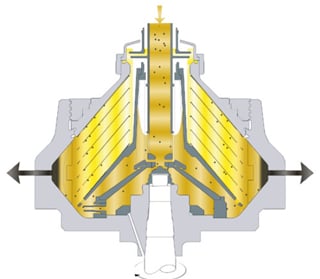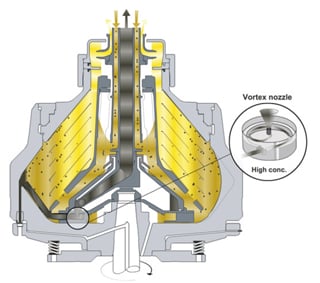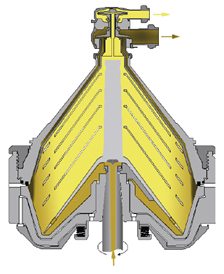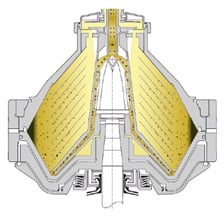Choosing the right high-speed separators
High-speed separators are critical components in several bio-based chemical production steps, for example microbial cell removal. And high-speed separator efficiency greatly affects yield, and it is essential that they deliver peak performance.
Separation factors to consider
It is important to choose high-speed separators that are matched to your specific operating conditions. Factors such as the concentration of cells and impurities in the fermentation broth are key. Other factors that should be analyzed before choosing a high-speed separator include:
- If the fermentation is performed by yeast cells or bacteria
- Broth viscosity
- Product density
- The properties of the chemical you are producing
Alfa Laval offers a wide range of high-speed separators, including hermetically sealed models. This means we can always help you find the perfect equipment for your process.
Yeast requires a much smaller
clarification area
One factor that affects separation a great deal is the size of the cells performing the fermentation. Yeast cells are roughly 6-8 times larger than bacteria and are therefore much easier to separate out from the fermentation broth.
During the research phase, it is sometimes possible to choose whether you are going to develop a process based on yeast or bacteria. If you have this opportunity, you should choose yeast rather than bacteria to reduce separation costs.
With yeast you need less separation equipment, which will save both investment and operating costs. For example, if you need to process 100 m3 fermentation broth per hour, you need one high-speed separator if you are running a yeast-based process. If you are using bacteria, you will instead need 6-10 high-speed separators (with a similar
clarification area).
Since high-speed separators rotate at high speeds, both power consumption and service costs need to be considered. So if you can get the job done using one separator instead of ten, you will greatly reduce operating costs, especially over the lifetime of the equipment.
Whitepaper: 10 ways to improve your bio-based chemical plant

Type FESX efficiently separates fluids with high cell content and solid impurities

Type MBUX separates both high and low cell contents

Type MBPX is ideal for small-size microorganisms and when cell content is high

